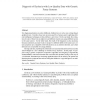Free Online Productivity Tools
i2Speak
i2Symbol
i2OCR
iTex2Img
iWeb2Print
iWeb2Shot
i2Type
iPdf2Split
iPdf2Merge
i2Bopomofo
i2Arabic
i2Style
i2Image
i2PDF
iLatex2Rtf
Sci2ools
127
click to vote
IJAR
2010
2010
Diagnosis of dyslexia with low quality data with genetic fuzzy systems
For diagnosing dyslexia in early childhood, children have to solve non-writing based, graphical tests. Curently, these tests are processed by a human expert; applying artificial intelligence techniques to this problem is not trivial. On the one hand, the evaluation of some of these tests is subjective and different experts can assign different scores to the same answer. On the other hand, the result of the diagnosis is also uncertain, because sometimes an expert wants to assign two different labels to the same case: certain symptoms are compatible with both dyslexia an an attention disorder, and a finer distinction is not possible for young children. Having said that, exploiting the information in uncertain datasets has been recently acknowledged as a new challenge in Genetic Fuzzy Systems. In this paper we propose using a genetic cooperative-competitive algorithm for designing a linguistically understandable, rule-based classifier that can tackle this problem, being a first step ...
Dyslexia | Expert | Genetic Fuzzy Systems | IJAR 2010 |
| Added | 27 Jan 2011 |
| Updated | 27 Jan 2011 |
| Type | Journal |
| Year | 2010 |
| Where | IJAR |
| Authors | Ana M. Palacios, Luciano Sánchez, Inés Couso |
Comments (0)

